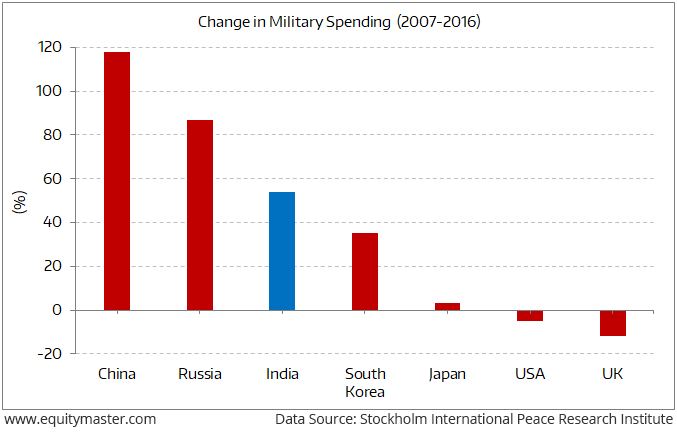The World's Biggest Multibaggers Are Headed You Way
Editor's Note: Dear reader, as you might be aware, I've planned a big event that I'm really excited about. If you attend this event, I'll show you how to make massive returns from stocks. I'm not talking about stocks that could go up 2 or 3 times. I'm talking about multibagger returns that could change your life forever. I've worked very hard on a project for the last few months and I believe I've discovered the secret to unlock life changing wealth. This is not an exaggeration on my part. I invite you to hear all the details for yourself at the event. I'm calling it the Rebirth of India. It will be held online on Thursday, 31 January and it's completely free. You can register for it here.

Japanese railways are renowned for their punctuality and precision.
The country's largest high-speed railway line has operated for almost half a century. But what is remarkable is that it never had a single derailment or collision.
If that's not enough, last year, its average departure delay was a mere 18 seconds, along a 320-mile route.
Can we expect such degree of safety and efficiency in Indian railways? Even though the country may soon have its first bullet train of Japanese make, we remain skeptical.
What is unique about Japanese railways is that it was amongst the first ones in the world to get privatised.
In 1987, the government privatised the Japanese National Railways. The company operated every type of transit except trams and inner-city metros. Eventually all the regional railway companies in Japan also had private sector owners.
With privatisation, the railway companies could repay their debt. They invested capital to improve and modernise their networks. And in the process, reversed the stagnation and decline that Japanese railway companies had seen over the previous decade.
By the year 2000, East Japan Railway Company featured in Forbes' Top 200 companies globally in terms of market cap.
And not just that. Subsequently, even during Japan's lost decades in the stock market, the stock multiplied nearly three times.
Privatisation did to Japanese railway companies what no government in the world could do to state owned transport entities. And the health of these companies was best reflected in their stock market fortunes.
Now just as Japanese railways are renowned for precision, the US Military is known to be the hotbed of new technology. Even the research on the internet, as we know it today, was originally funded by the US Department of Defence.
The end of the Cold War was a major turning point for the American defense industry. And with the privatisation of several defence related manufacturing entities in the 1980s, the sector was flush with funds for research.
Companies like Boeing and Northrop Grumman Corporation were amongst the first to benefit from this trend. These companies saw their stock prices multiply nearly 61 times and 56 times over past three decades.
You know that privatization is not a trend that is seen in economies every now and then. It usually occurs only once. Or possibly after decades.
Fortunately, few sectors in India are on the cusp of this trend for the first time ever.
And as investors in Indian stock markets, we find ourselves at the right place at the right time.
Like in the case of Japan and the US, privatization may not just create tremendous stock market wealth. But also push several Indian companies in the reckoning of global leaders.
I want to know what you think about this, dear reader. Which government company or industry would you like to see privatised? How much wealth do you think that would create?
Write to me with your opinion.
And I'll publish your views in The 5 Minute WrapUp.
Chart of the Day
The opportunity for India's private corporate sector is huge in the defence space. Of course, not many private companies have participated aggressively in bidding for defence contracts so far. But, this will change as the government spends more on defense.
According to the Stockholm International Peace Research Institute (SIPRI), India is the world's biggest arms importer and has remained so for many years now. While Russia was the world's largest exporter of arms to India, it is now being challenged by Israel and the US.
However, the Indian government wants increased participation from the country's private sector to reduce the need for imports.
This will open up massive opportunities for many domestic companies in the years to come.
Reckoning of Biggest Military Powers in the Making
Warm regards,
Tanushree Banerjee (Research Analyst)
Editor, The 5 Minute WrapUp
PS: Do you think India can regain its status as one of the greatest countries on earth? Equitymaster's co-head of research, Tanushree Banerjee, certainly thinks so. In a free online summit on Thursday, 31 January, Tanushree will show you how to amass life-changing wealth from India's rise to the pinnacle it last occupied nearly 2,000 years ago! You don't want to miss this, dear reader. Register now for the free online summit here.
Recent Articles
- All Good Things Come to an End... April 8, 2020
- Why your favourite e-letter won't reach you every week day.
- A Safe Stock to Lockdown Now April 2, 2020
- The market crashc has made strong, established brands attractive. Here's a stock to make the most of this opportunity...
- Sorry Warren Buffett, I'm Following This Man Instead of You in 2020 March 30, 2020
- This man warned of an impending market correction while everyone else was celebrating the renewed optimism in early 2020...
- China Had Its Brawn. It's Time for India's Brain March 23, 2020
- The post coronavirus economic boom won't be led by China.



Equitymaster requests your view! Post a comment on "The World's Biggest Multibaggers Are Headed You Way". Click here!
Comments are moderated by Equitymaster, in accordance with the Terms of Use, and may not appear
on this article until they have been reviewed and deemed appropriate for posting.
In the meantime, you may want to share this article with your friends!